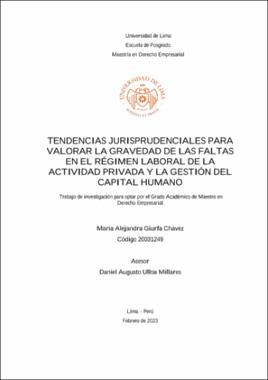| dc.contributor.advisor | Ulloa Millares, Daniel Augusto | |
| dc.contributor.author | Giurfa Chavez, Maria Alejandra | |
| dc.date.accessioned | 2023-04-12T15:19:01Z | |
| dc.date.available | 2023-04-12T15:19:01Z | |
| dc.date.issued | 2023 | |
| dc.identifier.citation | Giurfa Chavez, M. A. (2023). Tendencias jurisprudenciales para valorar la gravedad de las faltas en el régimen laboral de la actividad privada y la gestión del capital humano [Trabajo de investigación para optar el Grado Académico de Maestro en Derecho Empresarial, Universidad de Lima]. Repositorio Institucional de la Universidad de Lima. https://hdl.handle.net/20.500.12724/18051 | es_PE |
| dc.identifier.uri | https://hdl.handle.net/20.500.12724/18051 | |
| dc.description.abstract | In the present work, the jurisprudential trends to assess the seriousness of the faults and apply the sanctions to the workers of the labor regime of the private activity are analuzed. It should be noted that the single ordered text of Legislative Decree 728, labor productivity and competitiveness law, approved by Supreme Decree 003-97-TR (hereinafter the LPCL) regulates the just causes for dismissal, including the commission of serious misconduct, which in its article 25 it typifies those conducts as liable to be sanctioned, and in article 31 regulates the dismissal procedure. However, with our jurisprudence we will detail the tendencies to sanction the offending behaviors of the employees, either for minor offenses and serious offenses. In the same way, we dedicate a chapter to the flagrant gross misconduct, which by nature is difficult to be proven in a judicial process by the employer. We will also take into account the point of view of employers regarding jurisprudential trends, the internal work regulations (hereinafter the RIT) and the code of conduct of companies in relation to human management. It is important to consider the most frequent offending behaviors of workers according to the experiences of two human resources specialists; the relationship between the job profile and the signing of the employment contract; the advantages of due process in labor sanctions from the perspective of the economic analysis of law (AED), and finally the conclusions and recommendations for employers of the labor regime of private activity. | en_EN |
| dc.description.abstract | En el presente trabajo se analizan las tendencias jurisprudenciales para valorar la gravedad de las faltas y aplicar las sanciones a los trabajadores del régimen laboral de la actividad privada. Cabe señalar que el texto único ordenado del Decreto Legislativo 728, ley de productividad y competitividad laboral, aprobado por Decreto Supremo 003-97-TR (en adelante la LPCL) regula las causas justas de despido, entre ellas la comisión de falta grave, que en su artículo 25 tipifica aquellas conductas pasibles de ser sancionadas, y en su artículo 31 norma el procedimiento de despido. Sin embargo, con nuestra jurisprudencia detallaremos las tendencias para sancionar las conductas infractoras de los trabajadores, ya sea para las faltas leves y las faltas graves. De igual modo, le dedicamos un capítulo al procedimiento de la falta grave flagrante, la que por su naturaleza es difícil que sea probada por el empleador en un proceso judicial. También se tendrá en cuenta el punto de vista de los empleadores respecto a las tendencias jurisprudenciales, el reglamento interno de trabajo (en adelante el RIT) y el código de conducta de las empresas en relación a la gestión humana. Es importante considerar las conductas infractoras más frecuentes de los trabajadores según las experiencias de dos especialistas en recursos humanos; la relación entre el perfil del puesto de trabajo y la suscripción del contrato laboral; las ventajas del debido procedimiento en las sanciones laborales desde la óptica del análisis económico del derecho (AED), y finalmente las conclusiones y recomendaciones para los empleadores del régimen laboral de la actividad privada. | es_PE |
| dc.format | application/pdf | es_PE |
| dc.language.iso | spa | es_PE |
| dc.publisher | Universidad de Lima | es_PE |
| dc.rights | info:eu-repo/semantics/openAccess | * |
| dc.rights.uri | https://creativecommons.org/licenses/by-nc-sa/4.0/ | * |
| dc.source | Repositorio Institucional - Ulima | es_PE |
| dc.source | Universidad de Lima | es_PE |
| dc.title | Tendencias jurisprudenciales para valorar la gravedad de las faltas en el régimen laboral de la actividad privada y la gestión del capital humano | es_PE |
| dc.title.alternative | Jurisprudential trends to assess the seriousness of faults in the labor regime of private activity and the management of human capital | en_EN |
| dc.type | info:eu-repo/semantics/masterThesis | |
| thesis.degree.discipline | Derecho Empresarial | es_PE |
| thesis.degree.grantor | Universidad de Lima. Escuela de Posgrado | es_PE |
| thesis.degree.level | Maestría | es_PE |
| thesis.degree.name | Maestro en Derecho Empresarial | es_PE |
| dc.publisher.country | PE | es_PE |
| dc.subject.ocde | https://purl.org/pe-repo/ocde/ford#5.05.00 | |
| renati.author.dni | 42194349 | |
| renati.advisor.orcid | https://orcid.org/0000-0001-9622-4137 | |
| renati.advisor.dni | 7624785 | |
| renati.juror | Urbina Lobon, Erick Erwin | |
| renati.juror | Cardenas Robles, Carlos Alberto Victor Roberto | |
| renati.juror | Ulloa MIllares, Daniel Augusto | |
| renati.level | http://purl.org/pe-repo/renati/level#maestro | |
| renati.type | https://purl.org/pe-repo/renati/type#trabajoDeInvestigacion | |
| renati.discipline | 422167 | |
| ulima.cat | OI | |





